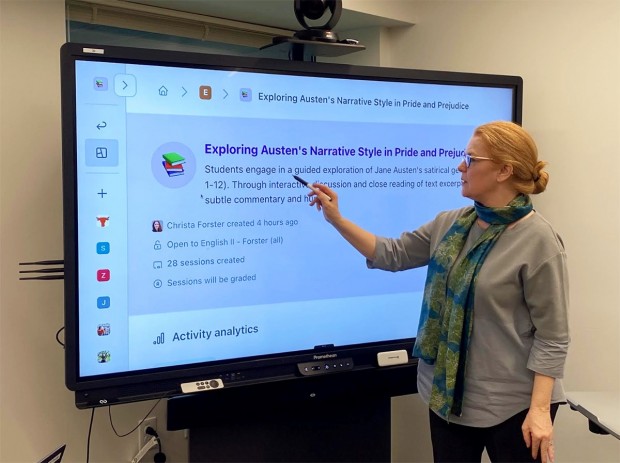New AI Learning Platform at Kinkaid


Upper School English teacher created a virtual discussion using Flint K-12 for students to explore Jane Austen's Pride and Prejudice. “I have seen Flint impact learning in a positive way, especially for students who struggle with learning differences. It helps them communicate their ideas clearly in a more time-efficient way,” said Ms. Forster.
In a significant step toward transforming the educational experience, this school year, Kinkaid has integrated Flint K-12, an innovative AI platform designed to enhance student learning.
Flint K-12 is an “all in one AI platform” that allows teachers to customize learning by designing AI for students to converse about classwork. After a chat is marked as complete, Flint provides personalized feedback for students with ideas for follow up learning objectives. Teachers also can see all student conversations with the AI, ensuring that chats are on task and productive.
“The feedback that Flint gives is really helpful for me to enhance my writing in English class. I use it to improve my essays and it gives me useful tips on what can be changed.” said sophomore, Alexia Hoffman.
On Thursday, January 31, the AI Student Committee had the opportunity to speak with the CEO of Flint K-12, Sohan Choudhury. Students spoke to him about AI, Flint K-12, and his journey.
Mr. Choudhury started by explaining the benefits of Flint K-12 over other commonly used AI models, such as Chat-GPT by Open AI or Gemini by Google. Flint K-12 ensures academic integrity, teacher visibility into student messages, and ease of use for both teachers and students.
“I’ve noticed that other GPT models tend to overcomplicate things or explain things in a way that doesn’t really align with what we’re learning in class. Flint is like an extension of the teacher, because the teacher puts in the information they want us to know. And with that, Flint is able to give more accurate and personalized information compared to other models,” said junior Sage Barreto.
Another unique aspect of Flint is its commitment to user privacy, ensuring that student chats are not used to train the model.
“We don’t use any student data, and we’ve been very strict about that from the beginning. If we did, most schools wouldn’t opt to use Flint,” added Mr. Choudhury.
While students have utilized Flint K-12 as a valuable learning tool, Kinkaid teachers are also leveraging the platform to enhance class instruction. By customizing AI chats to align with their lesson plan, teachers have been able to provide guidance beyond the classroom.
Upper School English teacher Ms. Christa Forster likes to utilize Flint in her classroom to enhance student discussions and essay feedback.
“I have seen Flint impact learning in a positive way, especially for students who struggle with learning differences. It helps them communicate their ideas clearly in a more time efficient way,” said Ms. Forster.
As Kinkaid continues to integrate AI into the classroom, Flint K-12 promises to refine student learning and streamline teaching, creating a more personalized and efficient educational experience.
“At the end of the day, we don’t want to replace what the teacher is doing, but instead help them, by augmenting their teaching. Our company’s goal is to make one teacher feel like 20 in the classroom and provide the highest level of instruction for every student,” said Mr. Choudry.
Want more buzz like this? Sign up for our Morning Buzz emails.
To leave a comment, please log in or create an account with The Buzz Magazines, Disqus, Facebook, or Twitter. Or you may post as a guest.


